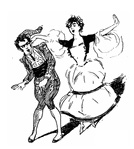“The Church’s Best Kept Secret”

An Introduction to Catholic Social Teaching
By Rodger Charles, S.J
Publisher: Ignatius
Pages: 111
Price: $9.95
Review Author: Thomas Storck
Catholic social teaching is something Catholic writers have often called “the Church’s best kept secret.” And although the Church’s social doctrine is an integral part of her patrimony, it has elicited little interest, even from Catholics. But in a world in which economic controversies make the front page of newspapers nearly every day, Catholics ought to be interested in what their Church says about economic justice.
Catholics need to learn what the Church actually teaches, for there are those who will spin Church teaching for their own ends — I’m thinking of the abridged and distorted version of the 1991 encyclical Centesimus Annus put out by a neoconservative, which both omitted and obscured passages apparently considered too critical of capitalism. Several months ago a secular magazine reported that George W. Bush was studying Catholic social teaching at the feet of this neoconservative (in order to learn how to attract Catholic voters).
One wonders whether Bush’s tutor was giving him the real thing. For those who want to know what the Church really teaches, a reliable source is essential. Many books on Catholic social teaching approach the subject chronologically, summarizing each papal encyclical in the context of its times. Another approach, the thematic approach, is what Fr. Charles provides here. In each section he introduces the problems, discusses Catholic teaching, and then includes excerpts from Catholic teaching — usually papal documents — illustrating the subject of that section. Unfortunately, in giving his excerpts, he does not quote them word for word but gives paraphrases.
Fortunately, however, Fr. Charles does boldly confront the foundations of modern liberal capitalist society. For example: “Human society…needs a principle of unity that goes beyond simple self-interest.” His statements on private property are excellent. For example: “God gave the world to all men in common, so that they might use its gifts for their benefit, and this universal destination of created goods gives us a proper perspective on private ownership: it is a good insofar as it helps mankind to realise the universal purpose for which the goods of the world were created.” He is also clear on the right of the state to own certain forms of property that “carry with them a dominating power so great that they cannot without danger be entrusted to private individuals,” on the right of the state to make rules and set limits for the use of private property, and on the state’s right to expropriate private property with compensation to the owners, all of which have been explicitly upheld by 20th-century popes.
Likewise, Fr. Charles offers a fine discussion of the origins of capitalism. He locates it squarely in the progressive de-Christianization of European society at the end of the Middle Ages, and does not hesitate to lay blame for the evils caused by socialism and Communism on those whose prior evils were the cause of their inception: capitalists and capitalism. And though he rightly points out that the excesses of capitalism today have been curbed by legislation and labor unions, he is not afraid to note that the spirit of capitalism is the same as it always was and that “whenever it is given the freedom to do as it wishes without let or hindrance” it reverts to its old ways.
Although this book is a valuable introduction to its subject, there are two additional objections that must be raised. The first is the omission of any mention of Occupational Groups, which Pius XI and Pius XII considered a key to solving the entire socio-economic problem. Such groups are designed to promote economic self-governance by all involved in a particular line of work, be they workers, managers, or owners. John Paul II has elaborated on this theme.
My second objection occurs when Fr. Charles, paraphrasing Centesimus Annus, asks whether capitalism is the “only alternative” today. His answer omits the crucial passage from Centesimus, namely, “it is unacceptable to say that the defeat of so-called ‘Real Socialism’ leaves capitalism as the only model of economic organization.” To omit this passage is to give the impression that Centesimus teaches that some form of capitalism is all that we can hope for today. But this passage shows that Catholics are free to work for alternative forms of economic organization.
Nonetheless, I do recommend this book. And although there is no substitute for reading the social encyclicals themselves in their entirety, Fr. Charles’s book can be a helpful vademecum in learning about this important part of Catholic doctrine.
You May Also Enjoy
The U.S. could have weaned Nicaragua away from the Soviets by the exercise of a little good neighborliness and the avoidance of a large amount of international immorality.
The savage killing of six Jesuit priests in El Salvador last November underscored once again…
The possession of great riches, though not to be condemned in itself, nevertheless presents grave difficulties to the soul that seeks perfection.

